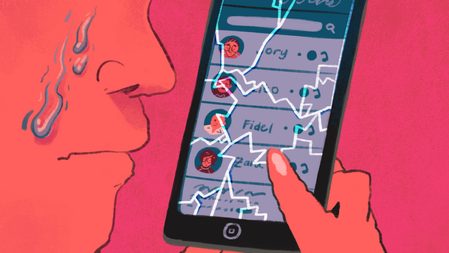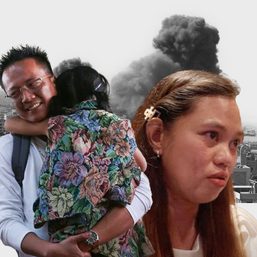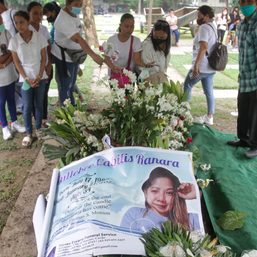SUMMARY
This is AI generated summarization, which may have errors. For context, always refer to the full article.
![[OPINION] I look for you: To long-distance friends](https://www.rappler.com/tachyon/2022/06/ispeak-ldr-friends-2.jpg)
Western cliches often depict the broken-hearted woman as a messy caricature of tears and ice cream, moping under a quilted duvet, or dazed on her couch in front of the TV. Soon enough, her girl-friends — always willing and available — come to her rescue with wine. They drag her from her sad-sack apartment for a night of therapeutic debauchery. I used to look at that woman with mixed feelings of sympathy and envy. Her friends were somehow always close by, and they were worth exponentially more than the good-for-nothing-cheater who had made her mascara run.
In my late twenties, as an Overseas Filipino Worker (OFW), I went through a catastrophic break-up while I was on a travel assignment. I was working as an occupational therapist at a skilled nursing facility in South Texas near the US-Mexico border. Those dearest to me were thousands of miles away.
Instead of locking myself up in my room and ugly-crying for days, I buried myself in my job, and I worked through immense pressure to keep things together. One day, I came home to find a big bouquet of red roses at my doorstep. I felt the vein in my temple pulse. My temper surged, and a cascade of expletives rushed through my mind. I knew that these just had to be a shitty attempt at repentance from my ex. When I opened the card, I was relieved to see that the flowers were from Erika, my close friend and former University of the Philippines classmate, who was based in California. The next morning, a colorful arrangement of kale and fruit arrived at work. These were from Reena, also a college friend, who had moved to Florida. From each coast, in spite of the distance, my Filipina friends managed to show up for me.
I have always thought of Filipino friendship as special. The Tagalog term for friend — kaibigan — has the word “love” (ibig) embedded in it. When asked whether I miss the Philippines, I say, I miss my family, I miss my friends, and honestly, sometimes, I even miss the grittiness of Manila, and I miss getting caught in the city’s dragnet of neurosis. But what does it truly mean to “miss?” In Tagalog when we say “I miss you,” we say “hinahanap kita”— I look for you. The element of looking, of actively seeking, is lost translation.
As the COVID-19 pandemic saw friend networks becoming more elusive, people found other means of keeping in touch through the likes of Zoom happy hours and backyard “socially-distanced” get-togethers. People experienced how long-distance friendships, compared to those kept in proximity, could be equally meaningful and reassuring.
Research has found that long-distance friendship is flexible, but not flimsy. Another study suggests that no difference exists in the perception of the support one derives from the relationship one has with a long-distance friend, when compared to that of a friend who is close by. Living in the United States — a vast land of diverse cultures — has led me to conclude that Filipino friends are the best friends, no matter where they are in the world. Filipino friends don’t just miss you, they look for you.
For myself and many members of my Filipino community abroad, even before COVID-19, we had already learned to fit our families overseas and friends out-of-state into our weekly calls and vacation traditions. I explained to my then-boyfriend-now-spouse, when we traveled for a mini-reunion to see my goddaughters (Reena’s and Erika’s first-born daughters), that my role as ninang (godmother) was more like “honorary aunt,” as opposed to “parental spare tire.” The lines between friends and family are blurred in our language and culture. Soon enough, my husband learned to call Filipino friends-of-my-parents or elder distant cousins “Tito” (uncle) and “Tita” (aunt). In kind, Gabriel and I became Tito and Tita to the children of my Filipino contemporaries.
Earlier this year, my friend Joanne put together a virtual reunion to commemorate our darling kaibigan Billy’s fifth-year death anniversary. Billy was living in New York when he was diagnosed with cancer. He moved back to the Philippines to continue his treatment and be near his family, and there passed away at the age of 34. Both he and Joanne were a year ahead of me in occupational therapy school. Billy also happened to be my “buddy,” the upper-classman randomly assigned to me, whose duty was to check in on how I was adjusting to college. I couldn’t have asked for a better buddy — Billy gave me all his old textbooks, which I highlighted to the point that every page practically glowed in the dark. He cheered me on in all my academic and non-academic successes; he made time to have fun and make chismis. I recently looked up the last exchanges I had had with him on Facebook Messenger. In one decade-old chat, I was inviting him to watch Taken 2 — I had forgotten that there had been a sequel and that I had seen it at the movies!
During the online memoriam, Billy’s friends showed up as tiles on the computer screen. From our respective locations — the Philippines, New York, New Jersey, Florida, Texas, Colorado, Hawaii — we listened to one another’s memories of our glamorous (compared to most of us in our field) friend, who worked hard and got to travel the world. I talked about what I was most proud of — that he was my buddy, and that he still kept calling me “buddy” even after we graduated. There were other Billy stories that were far more interesting: shared explorations of NYC, out-of-town trips, everyday adventures, celebrations, and reunions.
“He would have loved this,” one of his barkada had said, “He really loved being talked about.”
A month later, a “memory” of Billy from 2010 popped up in my Facebook page. It was a photo of him in a black leather jacket, handsome as ever, standing in the middle of a snow-covered Parisian Avenue lined with bare trees. Billy had tagged me and several of his close friends with the caption, “They who are near me.”
I realized how fortunate we were to have been there, in his thoughts at such a happy time in his life. I thought about how especially lucky Billy was to still have Joanne — a friend who continues to keep in touch, who misses him, who looks for him, in spite of their distance. – Rappler.com
Irene Carolina Sarmiento is the author of two illustrated children’s books, Spinning and Tabon Girl, both published by Anvil. Her stories have won awards from The Palanca Memorial Foundation, Philippines Free Press, Philippine Graphic/Fiction Awards, and Stories to Change the World. She is an occupational therapist with a master’s degree in Applied Cognition and Neuroscience.
Add a comment
How does this make you feel?

![[Two Pronged] I found out my husband is into ‘golden rain’ during our honeymoon](https://www.rappler.com/tachyon/2024/04/Two-Pronged-peeing-sex.jpg?resize=257%2C257&crop_strategy=attention)
![[Two Pronged] My friend has an abusive partner. What can I do?](https://www.rappler.com/tachyon/2024/04/limits-of-friendships-april-16-2024.jpg?resize=257%2C257&crop=414px%2C0px%2C1080px%2C1080px)
![[Two Pronged] Am I bi-curious? A lesbian? How do I explore these feelings?](https://www.rappler.com/tachyon/2024/04/two-pronged-bisexuality.jpg?resize=257%2C257&crop=283px%2C0px%2C720px%2C720px)
![[Two Pronged] Will watching porn and masturbating affect my future relationships?](https://www.rappler.com/tachyon/2024/03/two-pronged-single-female-30-year-old-virgin-porn.jpg?resize=257%2C257&crop=235px%2C0px%2C720px%2C720px)
![[WATCH] Spoil me but respect me: A sugar baby’s story](https://www.rappler.com/tachyon/2024/03/titlecard-03.jpg?resize=257%2C257&crop_strategy=attention)





There are no comments yet. Add your comment to start the conversation.